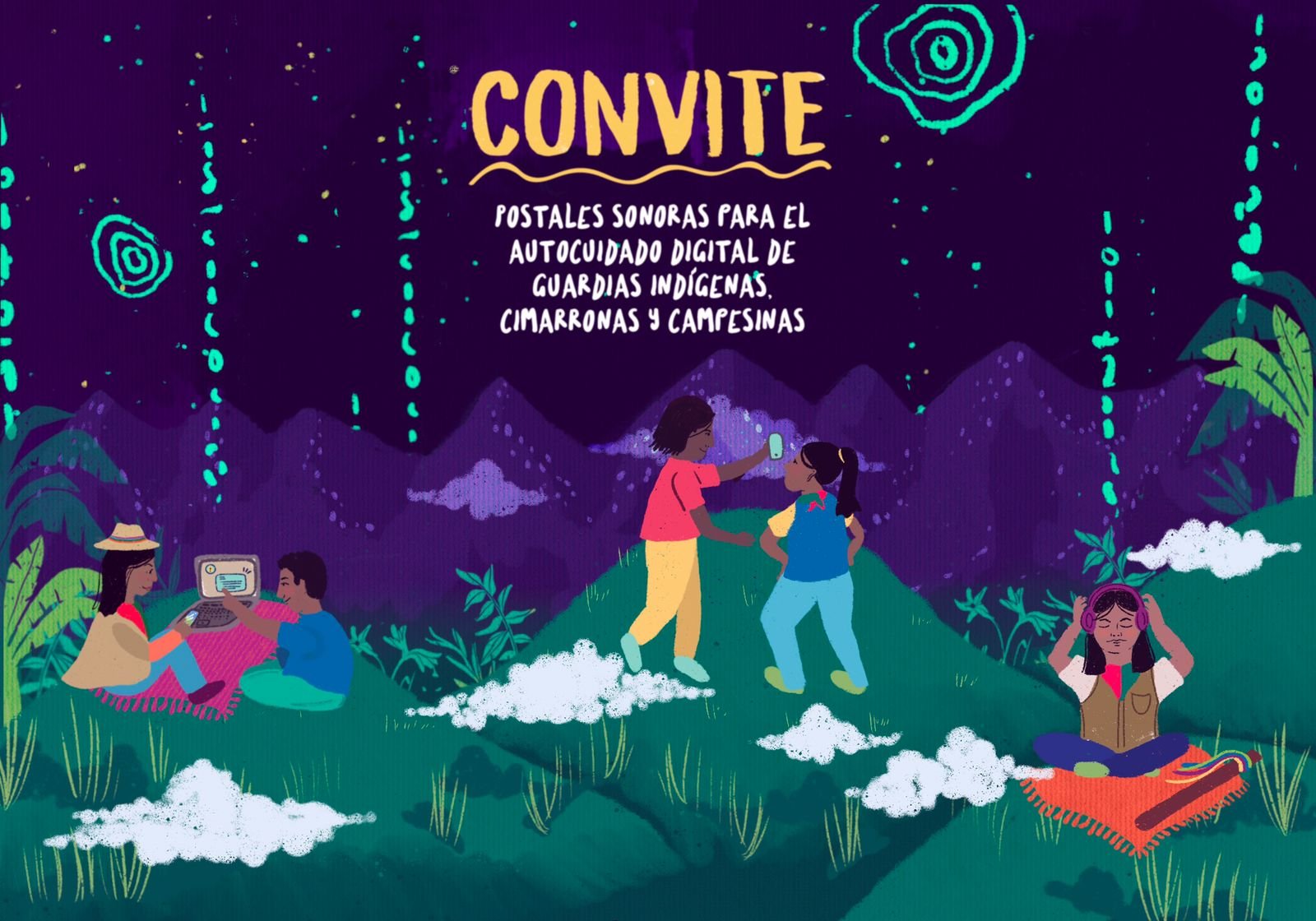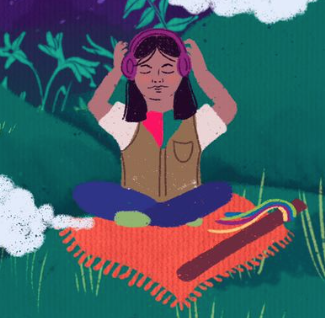Convite
About
Spanish version (original version) available here:
Convite is an awareness project about self-care and collective care, focused especially on indigenous guards, cimarronas, and rural (campesinas) communities from southwestern Colombia, as well as those who defend the environment, territorial autonomy, and alternative communication.
Through awareness workshops and the creation and circulation of sound postcards, Convite seeks to provide information, tools, and resources for self-care, protection, and security in digital, physical, and psychosocial spaces.
Above all, it is a collaboration between the human rights community in the digital age and indigenous, Afro-descendant, and peasant communities from southwestern Colombia. However, these efforts can be adapted and embraced in other Latin American contexts. For the second phase, we have created a curriculum that can be used as a guide in other knowledge exchange spaces, which you can find here, along with a new series of nine sound postcards that you can listen to below.
Listen to our sound postcards here.
You can listen to our sound postcards on platforms such as Spotify, Apple Podcasts, or any podcast directory you use. Additionally, on archive.org, you can find Phase 1 here and Phase 2 here.
((( THEY SOUND HERE ↓ )))))
Vamos carajo: Who are behind the resources, tools, programs, and applications related to the defense of human rights in digital spaces? Here you can hear what we advocate for in these spaces
Abrume digital: In this 'return' postcard, defenders, guardians, and leaders share with us how they protect themselves physically, digitally, and mentally.
Sancocho: If you want to learn about your digital rights, listen to this postcard where the Convite team shares their learnings and approaches to the topic.
Abrir camino: After learning about the VPN options that we have already shared in Convite, we invite you to explore the option provided by the Tor project to browse securely, privately, and anonymously
Kiwe Thegna: In Nasa is Better. Listen to self-care tips and collective digital care in Nasa Yuwe and Spanish
Palabrear: Is your 'digital self' sensational? Learn more about the different aspects to consider when building your profiles in digital spaces
Uramba: To which organizations could we turn in case of experiencing violence in digital environments? Here we mention some organizations, institutions, and collectives, as well as other general advice.
GUARDIA: which tool are useful to encrypt data and documents?
Bichofue: None type of messaging is totally safe, but here we suggest the ones that come closest.
Minga
Social networks, privacy and security. Inhabiting social networking platforms can be a challenge. The first thing we should ask ourselves is what
is the digital identity I want to build on that platform and what are the risks or attacks I want to protect myself from. One of the first steps you
can take is to enter the security settings of each of the platforms and adapt them according to your preferences. To listen to more tips give play to the postcard.
Palenque
If you want to know if the page you are visiting on the Internet is safe, we recommend that it has the S for safe. helpful tools: https-everywhere, VPN a tunnel. In this postcard, the kiwe thegnas explain to us how does a VPN works and we recommend you to use:
PENILLA-MACHETE: we talked about interceptions. At the end we give you 8 tips to avoid interceptions in your cellphone.
CHUMBE
Alternatives for sending documents and collaborating on documents (other than Google Drive)
Riseup -Share Riseup-
Rise up pad
Also check out open archive.
how does it works?
At Convite, we host a series of in-person and virtual meetings where we conduct activities focused on raising awareness and providing introductory tools for digital, physical, and psychosocial self-care and collective care.
From these meetings, questions arise that need answers or topics that people want to learn more about. These concerns are shared with a diverse group of digital security trainers, activists, and developers from Latin America and Spain, who not only provide answers but also pose a question to the Convite community.
This exchange of questions and answers materializes into a series of audio recordings we call "Sound Postcards," which can be listened to, downloaded, and freely shared. The sound postcards are short audio clips, making them accessible to a wider audience without the need for a high-quality connection.
Illustration: Convite 2021. Map by Herrera in co-design with Convite members.
A meeting of perspectives on self-care and collective digital care.
It's important to mention that this convite/minga/uramba is in constant exchange, and we continue to welcome new collaborators. Here, efforts, knowledge, and experiences of the entire community involved in the project are communicated and put into action. The topics and methodologies we work on at Convite are connected, with respect, to the worldviews and cultures of the people involved in the project, including indigenous guards from the southwestern region of the country; rural cimarron guards from Cali and Cauca, peasant guards from Valle del Cauca and Cauca; individuals dedicated to music and visual arts, and advocates for the rights of those who have been victims of the armed conflict in Colombia.
In 2019, the work of sowing/harvesting remained a focal point. When we sow, we prepare the land to deposit, under many layers, valuable contents that communities have cared for and maintained for centuries. We wanted communities to think of their information and data as seeds that must be protected by layers, and we must carefully consider where they are deposited. One of Convite's objectives is to engage more people from rural contexts in Latin America in discussions such as privacy, self-care, and internet security from a feminist perspective. Each of the sound postcards uses storytelling to address community concerns about their relationship with digital spaces, blending testimonials, décimas (ten-line poems), and the voices of kiwes thegnas - caretaker individuals - who whispered to the radio in Spanish and their mother tongue, as well as voices from the human rights community in digital spaces from different countries in Latin America and Spain. The sound design of the postcards is inspired by the landscapes heard in the territories inhabited by the project's focus communities, their own music, and the décimas that emerged during the accompaniment by the musical group Volver a vivir. The titles and some key aspects of the postcards are inspired by different symbols and tools from the worldviews and culture of indigenous, cimarron, and peasant guards, seeking metaphors between the defense of their physical territory, the defense of their rights in digital territories, and the way they have narrated their struggles through their music, weaving, hairstyles, among others.
In 2021, we began the second phase of the project amidst a very particular context: the pandemic and the national strike.
On April 28, 2021, a historic national strike began in Colombia. What started as a one-day event lasted for over 50 days and was violently suppressed by state forces. In Cali alone, more than 30 people were killed, with 13 deaths occurring on May 28, just one day of protests. During those months, Cali became the epicenter of the demonstrations, and all aspects of life in the city were affected in some way, from collective feelings of unease and fear to difficulties in obtaining food or transportation.
Despite the violence, various forms of collective organization emerged as resistance: community kitchens, popular assemblies, fundraising for first aid and food, and alternative media coverage. The city endured difficult months after the strike, and it was during those days that we began to gather to think and work on the second phase of Convite, which had to be postponed due to the aforementioned events.
The state repression of social mobilization through violence and surveillance in physical spaces also spilled over into the digital realm through strategies such as profiling, cyberpatrolling, and social media censorship. This scenario led participants in the second phase of Convite to arrive with new questions, interests, and concerns. Taking this context into account and drawing
To provide content tailored to grassroots communities that have not necessarily been included in digital security discussions, such as peasant, indigenous, and Afro communities. We aim for the sound postcards to contribute to the work of communication officers within these movements. Additionally, we hope that both the postcards and other materials we have developed, such as the Curriculum and graphic pieces, can be useful to facilitators and digital security trainers who focus their work in rural areas across different countries.






